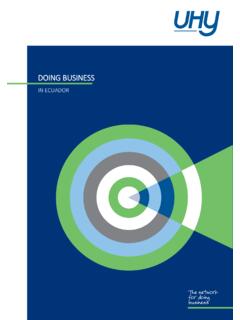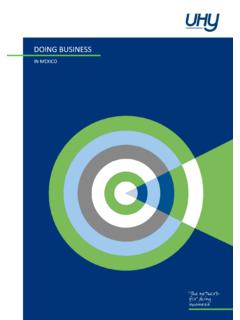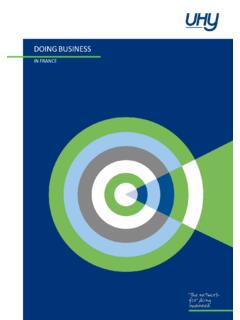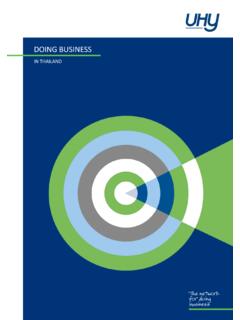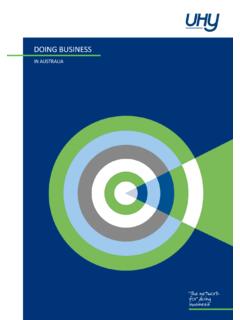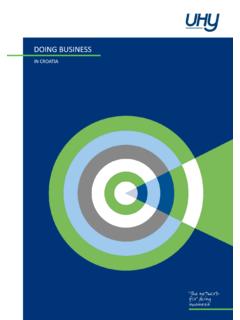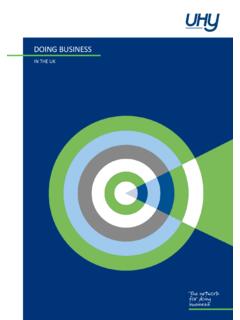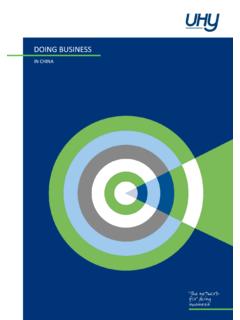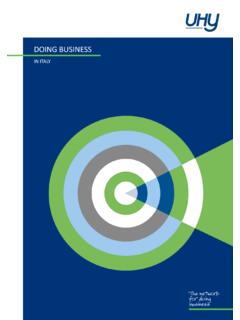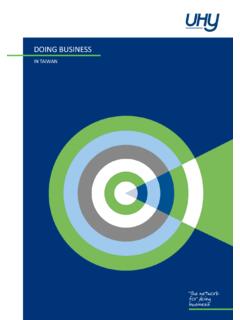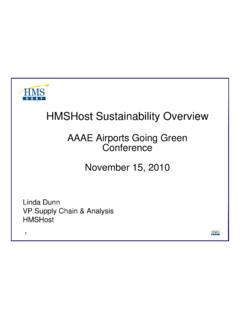Transcription of UHY Doing Business Guide - UHY International
1 Doing Business IN morocco CONTENTS 1 Introduction 3 2 Business environment 4 3 Foreign Investment 13 4 Setting up a Business 20 5 Labour 24 6 Taxation 27 7 Accounting & reporting 33 8 UHY Representation in morocco 34 3 Doing Business IN morocco 1 INTRODUCTION UHY is an International organisation providing accountancy, Business management and consultancy services through financial Business centres in around 90 countries throughout the world. Business partners work together through the network to conduct transnational operations for clients as well as offering specialist knowledge and experience within their own national borders.
2 Global specialists in various industry and market sectors are also available for consultation. This detailed report providing key issues and information for investors considering Business operations in morocco has been provided by the office of UHY representatives: UHY BEN MOKHTAR & CO 15 Rue Imam 1er tage Tangier, 90000 morocco Phone +212 539 94 45 93 Website Email Mr. Mohamed Ben Mokhtar any inquiries you may have. A detailed firm profile for UHY s representation in morocco can be found in section 8. Information in the following pages has been updated so that they are effective at the date shown, but inevitably they are both general and subject to change and should be used for guidance only.
3 For specific matters, investors are strongly advised to obtain further information and take professional advice before making any decisions. This publication is current at January 2018 We look forward to helping you do Business in morocco . 4 Doing Business IN morocco 2 Business ENVIRONMENT Situated in North Africa at the western edge of the Islamic world, morocco dominates the southern shore of the Straits of Gibraltar and has been an important strategic prize since ancient times. It has a population of over 32 million and an area of 446,550km (710,850km with Western Sahara).
4 HISTORY OF morocco Around 1100BC, the Phoenicians established trading settlements along morocco s Atlantic coastline. The territory became part of the Roman Empire after the fall of Carthage in 146BC. During the 7th and 8th centuries AD, morocco was conquered by Arab armies and converted to Islam. Gradually, Arabic replaced Berber as the primary spoken language. By the 16th century, morocco had become an important Sultanate that confronted Spanish expansion and established diplomatic ties with other European states. In 1777, Sultan Sidi Mohamed Ibn Abdullah, the most progressive of morocco s Barbary leaders, was one of the first foreign heads of state to grant diplomatic recognition to the newly independent United States of America.
5 Gradually, European colonial expansion threatened Moroccan independence. By 1912, the country was partitioned by Spain and France. morocco was granted independence by France in 1956 under King Mohamed V. The Spanish territories were soon incorporated, except for the port cities of Ceuta and Melilla, and the Spanish Sahara, which was retained by Madrid until 1975. The power of morocco s monarchy has remained remarkably resilient since independence. After the death of Mohamed V in 1961, the new king, Hassan II, deftly forged an alliance with rural leaders that would pave the way for a successful constitutional referendum in December 1962 and parliamentary elections in April 1963.
6 In the wake of political unrest directed at the monarchy in the early 1970s, Hassan II initiated a Moroccanisation programme that sped the transfer of French-held businesses to Moroccans. In the 1980s, opposition political parties were permitted to emerge. During the 1990s, the king brought opposition leaders into the political mainstream, which in 1997 yielded a parliament with an opposition majority. 5 Doing Business IN morocco The death of Hassan II, on July 29 1999, ushered in an entirely new style of royal leadership. King Mohammed VI, the late king s oldest son, implemented a sweeping agenda that sought to reduce social inequalities and implement democratic reforms.
7 Promising to take on poverty and corruption, while creating jobs and improving morocco 's human rights record, in February 2004, he enacted a new family code, the Mudawana, which granted women more power. POLITICAL SYSTEM King Mohammed VI has ruled morocco since the death of his father, King Hassan II, in July 1999. The latest ruler in a long dynastic line of Alawites, Mohammed VI is morocco s constitutional monarch and because of his direct lineage to the Prophet Mohammed, the founder of Islam, serves as his country s spiritual and moral Guide . King Mohammed VI introduced a new constitution in 2011, granting more powers to parliament, which enable it to discharge its representative, legislative, and regulatory mission.
8 In addition, the powers of the judiciary were granted greater independence from the king. A referendum on constitutional reforms was held on 1 July 2011 and was approved by the majority of voters. This new constitution is considered as a suitable way of initiating the Moroccan alternative towards democracy. The set of approved political reforms implemented some of the following changes: King Mohamed VI appoints a prime minister from the party that wins the most seats in parliamentary elections High administrative and diplomatic posts are now appointed by the prime minister in consultation with the ministerial council, which is presided over by the king The prime minister is the head of government and president of the Council of Government.
9 He has the power to dissolve parliament The prime minister will preside over the Council of Government, which prepares the general policy of the state The judiciary system is independent from the legislative and executive branch. Today, the government is still supported by a bicameral parliament whose lower house consists of 395 members in the Chamber of Representatives (Majlis an-Nuwab), elected by popular vote for five-year terms. The 120-seat Chamber of Advisors in the upper house, whose members are elected by indirect universal suffrage for six-year terms, comprises professional associations, trade unions, and elected local councils.
10 There are 33 officially recognised political parties in morocco . The political leaning of a majority of these parties is left-of-centre, but several parties are right-wing. Currently, the moderate Islamist Justice and Development Party (PJD) Political party in power, headed by Sa deddine El Othmani, the current prime minister. Since ascending to the throne in July 1999, King Mohammed VI has taken unprecedented steps to make the manner in which morocco is governed more transparent and democratic. 6 Doing Business IN morocco THE ECONOMY Business ENVIRONMENT morocco is uniquely positioned as a regional centre for trade , manufacturing, warehousing, redistribution, sales and call centres, and has an array of IT services reaching the European Union (EU), West-, Central- and North Africa, the Middle East and Eastern Europe.
